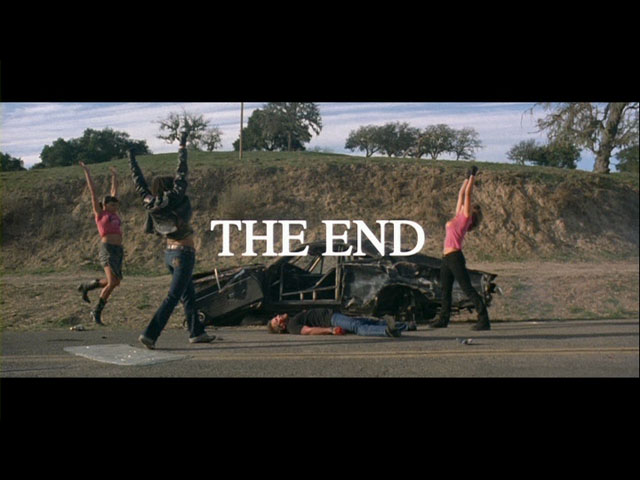
Planet Terror
Directed by Robert Rodriguez
In a shopworn storyline, an experimental bio-weapon is released on a deep south town, turning its residents into zombie-like flesh eating creatures. All that 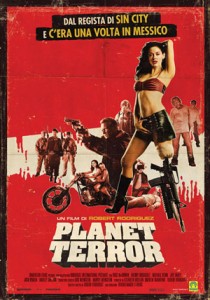 stands between them and the end of the world is a rag-tag group of brave survivors who decide to fight back, led by go-go dancer Cherry Darling (Rose McGowan) and her machine gun for a leg.
stands between them and the end of the world is a rag-tag group of brave survivors who decide to fight back, led by go-go dancer Cherry Darling (Rose McGowan) and her machine gun for a leg.
In this outrageous tribute to schlock horror, Robert Rodriguez puts the grind into Grindhouse. Planet Terror, the second half of the exploitation double bill that began with Tarantino’s Death Proof
is a well-crafted modern day drive-in movie that simply aims for big spectacle and retro silliness. Cineastes nostalgic for 70’s mediocre filmmaking will find themselves engulfing every frame that
blithely exploits all the exploitation conventions -sex, nudity, vehicular horror, explosions, stunt work, terrific special effects and more.
Fans of genre film will find themselves transported back to the spirit of a magical era of cult cinema. Rodriguez pays homage to the gruesome shockers of the early 1980s and late 70s, capturing their sleazy vibe while upping the ante of lurid gore. Planet Terror comes complete with missing reels, a scratched print, cigarette burns, various film stock (that drastically changes from scene to scene), deliberately choppy editing, nauseating cinematography, cheesy dialogue and unrelated filler sequences. Applied to a double-bill along with the inclusion of Rodriguez’s spoof trailer for Machete, Planet Terror is the closest anyone has come to recreating the Times Square grind-house experience.
Apart from the overall look of the film, the cast is fantastic particularly McGowan, a blubbering pole dancer who becomes the film’s iconic image and lead avenger. The one-time wanna-be medical student and now aspiring stand-up comedienne becomes a gun-toting heroine after a crazed zombie attack. Marley Shelton is equally good as the homicidal doctor planning to leave her husband (Josh Brolin) to run off with her once lesbian lover (Stacey Ferguson, aka Fergie). Brolin and her share great onscreen chemistry as the troubled cohabitants. Freddy Rodriguez fairs well in his first starring role as an action star. His months practicing firing guns, handing knives and choreographing fight sequences paid off. Tom Savini gets frequent laugh-out-loud funny moments, and Robert Rodriguez’s real life nieces “The Babysitter Twins” and real life son Tommy, supply two of the film’s most memorable scenes. Unfortunately the cast doesn’t always work. Tarantino cameos as rapist #1, a soldier who takes a liking to McGowan’s physical resemblance to Ava Gardner. In addition Bruce Willis pops up to no particular effect leaving one to wonder if he just accidentally walked on set.
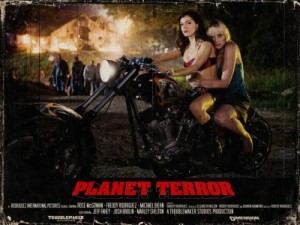 Luckily Planet Terror features more good than bad. Images of Dakota struggling to open a car door with anaesthetized hands and Josh Brolin under attack by the undead via a power saw will linger in your head. The early mix of Tex-Mex action, hospital melodrama, Showgirl horror, mad scientist mayhem and biological warfare makes for a highly entertaining exploitation thriller. Sadly the last act doesn’t quite live up and the end result is a wildly uneven horror-comedy that starts tight only eventually loses focus.
Luckily Planet Terror features more good than bad. Images of Dakota struggling to open a car door with anaesthetized hands and Josh Brolin under attack by the undead via a power saw will linger in your head. The early mix of Tex-Mex action, hospital melodrama, Showgirl horror, mad scientist mayhem and biological warfare makes for a highly entertaining exploitation thriller. Sadly the last act doesn’t quite live up and the end result is a wildly uneven horror-comedy that starts tight only eventually loses focus.
Still without Death Proof riding against it, you would think Planet Terror may be left without a leg to stand on, but much like it’s female protagonist, Terror fights back with as much over-the-top gruelling action and horror as it can possibly cram in 126 minutes. If you are only looking for depth and substance in movies, stay clear – everyone else sit back and enjoy the genre-savvy pull of high-octane exploitation.
Death Proof
Directed by Quentin Tarantino
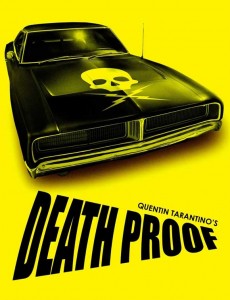
The obvious reference points of Death Proof are such movies as Vanishing Point, Dirty Mary Crazy Larry and even Steven Spielberg’s Duel, but Proof is influenced by more than just vehicular horror. It’s a grim stalker picture, a slasher film and a blaring anthem to female empowerment. It’s also a small masterpiece, dredged up from the sadistic mind of a movie fanatic of everything cinema. But while playing by the genre rules he, unlike Rodriguez, also gleefully subverts the genre to keep us thoroughly entertained. While Robert Rodriguez attempted to follow the “grind-house” formula step by step and create a carbon-copy, Tarantino tried a more ambitious approach. Many will say he failed to live up to the “grind-house” mantle, but regardless Proof is a sly work of film criticism, commenting upon movie genres and gender roles.
Proof is an audacious hell-bent head trip with a well-executed buildup of expectations, suspense and contrast. The first half feeling closer to Jean Renoir’s A Day in the Country, takes place on a dark, raining night amidst a dingy Texan bar intact with neon lights, sleazy customers and a soulful soundtrack of rare 70’s pop tunes. The second half takes its bareness from Southern backroads, bright daylight, sun-baked cinematography, highway winds and a twangy score in place of soundtrack. Much like the two sets of women, the two halves work as contrasting doubles. Death Proof, in tone, begins as a period piece but then shifts gears to a quartet of contemporary Hollywood women. Notice some interesting tensions between the old and new in everything from pop culture, photography, automobiles, visual effects, music, clothing, hairstyles, telephone and audio recording devices etc.
Despite the fact that Death Proof is an action film it is also deliberately atmospheric and very patient taking its time getting around. Every character’s distinctive rhythm, the variety of moods is slowly unravelled in the director/writers’s uncanny ear for dialogue. The misconception about Tarantino is that he is interested not in human beings but in hollow filmic reflections. Many complain about the “pointless” chatter but the girl’s talk is just as important as their body language and their surroundings. In fact the conversations mirror the eventual faith of all nine women. In act one, small moments like Stuntman Mike’s progressive intrusion into their inner circle of friends hints on the eventual proceedings while the second half’s opening Reservoir Dogs “breakfast conversation” maps out the remaining forty five minutes of the pic. So, yes, the characters talk in tough, vulgar home-brewed Tarantino espresso dialogue swathed in several layers of quotation marks, but that still makes for better writing than what we get in Planet Terror.
unravelled in the director/writers’s uncanny ear for dialogue. The misconception about Tarantino is that he is interested not in human beings but in hollow filmic reflections. Many complain about the “pointless” chatter but the girl’s talk is just as important as their body language and their surroundings. In fact the conversations mirror the eventual faith of all nine women. In act one, small moments like Stuntman Mike’s progressive intrusion into their inner circle of friends hints on the eventual proceedings while the second half’s opening Reservoir Dogs “breakfast conversation” maps out the remaining forty five minutes of the pic. So, yes, the characters talk in tough, vulgar home-brewed Tarantino espresso dialogue swathed in several layers of quotation marks, but that still makes for better writing than what we get in Planet Terror.
Much like Planet Terror, Death Proof boasts an astonishing look with a worn-out print covered in scratch marks, cigarette burns, bad jump cuts and missing reels. But the ensemble cast is much more talented and better suited for their roles. While Planet Terror lacks a memorable villain, Death Proof gets the bragging rights of landing the iconic star of genre films Kurt Russell. Russell turns in a tour-de-force performance as the smooth-talking tough guy who gets his kicks from vehicular homicide. Tarantino’s gift for rescuing iconic actors thought to be past their prime is once again in full effect. With Russell and Tarantino working together, we see a movie star and a director in perfect harmony. The remaining cast is uniformly strong. Everyone from stuntwoman Zoe Bell to Sydney Poitier and Rosario Dawson, not to mention a riotously funny performance from Tracie Thorns and the wild card Rose McGowan.
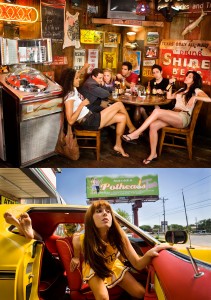 The car crash that ends the first half is a breathtaking slice of gory mayhem shown four times from various points of view. Tarantino may lack the budget of bigger action films, but not the talent to skilfully capture the horror of a car wreck. Finally the inner (or outer) fan-boy is treated to a climax that is more shocking, vicious and hysterically satisfying than that of Planet Terror. The extended car chase is a bona fide old-school tour de force, a sheer brutal and sheer primal statement on the new power balance of the sexes. Jammed with astonishing stunt work (absent of CGI), the climax will leave you gasping for time out. Tarantino’s sadistic ode to muscle cars and “organic” movie stunt work is sheer genius.
The car crash that ends the first half is a breathtaking slice of gory mayhem shown four times from various points of view. Tarantino may lack the budget of bigger action films, but not the talent to skilfully capture the horror of a car wreck. Finally the inner (or outer) fan-boy is treated to a climax that is more shocking, vicious and hysterically satisfying than that of Planet Terror. The extended car chase is a bona fide old-school tour de force, a sheer brutal and sheer primal statement on the new power balance of the sexes. Jammed with astonishing stunt work (absent of CGI), the climax will leave you gasping for time out. Tarantino’s sadistic ode to muscle cars and “organic” movie stunt work is sheer genius.
Some call it a masturbatory fantasy project but Tarantino’s kinetic action sequences, and his voracious love for cinema in all its incarnations make for a work of art. More importantly Death Proof doesn’t simply comment on its genre inspirations but adds to their very legacy.
– Ricky

